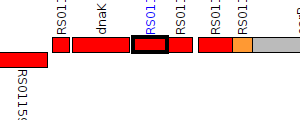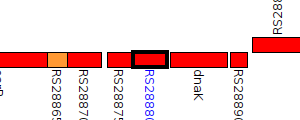In order to generate a more inclusive dataset of Pseudomonas genes mapped to putative in-paralogs and putative orthologs in other Pseudomonas species/strains, we developed a Pseudomonas Orthologous Groups classification system.
To generate ortholog groups, pair-wise DIAMOND searches were run on all genomes in the database to find reciprocal best hits (RBHs) for each gene. These analyses often resulted in multiple candidate genes for RBH status, which were narrowed down by examining the similarity between the query's flanking genes and the hit's flanking genes. If two candidate genes were directly adjacent, they where both accepted as RBHs that involve putative in-parology.
Pairwise intra-genome DIAMOND searches were also performed to acquire in-paralog information (i.e. gene duplications occurring after species divergence). If two genes in one genome were reciprocally more similar to each other than to any gene in the other genomes, the two genes were designated putative in-paralogs. Ortholog groups are built by starting with a seed gene and then adding all genes to which there is a RBH or in-paralog relationship.
Every new gene added to an ortholog group was then treated as a seed gene and the addition process was repeated until all qualifying genes had been added. The result was the development of orthologous groups, specifically generated for Pseudomonas species genomes, which can be used to sort search results.
Pseudomonas Ortholog Group POG004404
| Strain | Locus Tag | Description | Same-Strain Members | Fragment ? | |
|---|---|---|---|---|---|
| Pseudomonas aeruginosa CF27 - Assembly GCF_000481905.1 | Q003_05116 |
molecular chaperone DnaJ
|
1 member |

|
|
| Pseudomonas aeruginosa CF5 - Assembly GCF_000481885.1 | Q004_04327 |
molecular chaperone DnaJ
|
1 member |

|
|
| Pseudomonas aeruginosa CF614 | Q093_05206 |
molecular chaperone DnaJ
|
1 member |

|
|
| Pseudomonas aeruginosa CF77 | Q092_02091 |
molecular chaperone DnaJ
|
1 member |

|
|
| Pseudomonas aeruginosa CF_PA39 - Assembly GCF_000568235.2 | AX20_RS0115945 |
molecular chaperone DnaJ
|
1 member |

|
|
| Pseudomonas aeruginosa DK2 | PADK2_25270 |
chaperone protein DnaJ
|
1 member |

|
|
| Pseudomonas aeruginosa DSM 50071 - Assembly GCF_001042925.1 | TU83_RS26630 |
molecular chaperone DnaJ
|
1 member |

|
|
| Pseudomonas aeruginosa DSM 50071 - Assembly GCF_001045685.1 | PA50071_RS24805 |
molecular chaperone DnaJ
|
1 member |

|
|
| Pseudomonas aeruginosa E2 - Assembly GCF_000482005.1 | P998_03825 |
molecular chaperone DnaJ
|
1 member |

|
|
| Pseudomonas aeruginosa F22031 | F22031_RS07430 |
molecular chaperone DnaJ
|
1 member |

|
|
| Pseudomonas aeruginosa F9676 | ADJ52_RS02230 |
molecular chaperone DnaJ
|
1 member |

|
|
| Pseudomonas aeruginosa FRD1 - Assembly GCF_000829885.1 | EG09_RS23840 |
molecular chaperone DnaJ
|
1 member |

|
|
| Pseudomonas aeruginosa FRD1 - Assembly GCF_000950725.1 | UC33_RS17385 |
molecular chaperone DnaJ
|
1 member |

|
|
| Pseudomonas aeruginosa H1l | U864_RS0107830 |
molecular chaperone DnaJ
|
1 member |

|
|
| Pseudomonas aeruginosa HB15 - Assembly GCF_000215795.4 | PA15_0323280 |
molecular chaperone DnaJ
|
1 member |

|
|
| Pseudomonas aeruginosa isolate RN21 | PARN21_RS28880 |
molecular chaperone DnaJ
|
1 member |

|
|
| Pseudomonas aeruginosa JJ692 - Assembly GCF_000481805.1 | Q008_06131 |
molecular chaperone DnaJ
|
1 member |

|
|
| Pseudomonas aeruginosa JMM | RLJV_04085 |
molecular chaperone DnaJ
|
1 member |

|
|
| Pseudomonas aeruginosa LES400 | T222_RS57770 |
molecular chaperone DnaJ
|
1 member |

|
|
| Pseudomonas aeruginosa LES431 | T223_26335 |
molecular chaperone DnaJ
|
1 member |

|